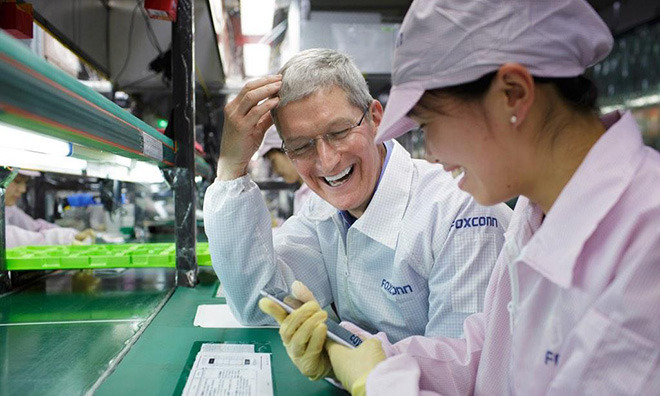Three of Apple's key suppliers — Foxconn and its subsidiary Sharp, as well as chipmaker TSMC — Â have all expressed interest in taking advantage of business-friendly incentives proposed by incoming U.S. President Donald Trump, though no commitments have been made.
Foxconn and Sharp are considering building an LCD manufacturing plant in the U.S., a Sharp executive said Friday, according to Nikkei. While the option is "on the table," the unnamed executive said such a decision must be made "carefully."
If it happens, the plant could come as a result of SoftBank's $50 billion investment in the U.S., aimed at creating 50,000 jobs. SoftBank is a partner of Foxconn.
If a U.S. LCD plant from Sharp and Foxconn were to come to fruition, sources told Nikkei that it could be about the same size as a recently announced display manufacturing plant in Guangzhou, China. That facility, scheduled to open in the fall of 2018, has a price tag of $8.69 billion.
Foxconn officially acquired Sharp for $3.5 billion last March.
The report also reiterated that Foxconn itself is also exploring the possibility of moving manufacturing to the U.S. Those ongoing evaluations were first revealed last November, though the verdict has been mixed on whether such a move would be cost effective.
Separately, Apple chipmaker Taiwan Semiconductor Manufacturing Co. Chairman Morris Chang said his company could also build a manufacturing plant in the U.S., according to DigiTimes. As with Foxconn and Sharp, Trump's talk of incentives for U.S. manufacturing have TSMC weighing their options.
Also as with Foxconn and Sharp, however, the possibilities are preliminary, at best. Chang himself cautioned that TSMC building chips in America "may not necessarily be a good thing."
Regardless, TSMC expanding to the U.S. is not a far-fetched concept: Competing Apple chipmaker Samsung builds iPhone chips at a fabrication facility located in Austin, Tex.
TSMC revealed that about 65 percent of its total wafer revenues in 2016 came from the U.S., and the company expects that America's share of its business will retain the lion's share in 2017.
 Neil Hughes
Neil Hughes








-m.jpg)






 Charles Martin
Charles Martin
 Christine McKee
Christine McKee
 Wesley Hilliard
Wesley Hilliard
 Malcolm Owen
Malcolm Owen
 Andrew Orr
Andrew Orr
 William Gallagher
William Gallagher
 Sponsored Content
Sponsored Content








10 Comments
An LCD plant? One would think OLED more likely. Isn't the Foxconn-Sharp plant in Guangzhou for OLED, which seems to be the future?
And probably 90% of these factories will be robots so I don't see the advantage of doing this other than maybe tax dollars. I seriously doubt it will create a significant amount of jobs like Trump thinks it will.
I have a feeling some of this is political. Taiwan, being such a small country (or territory), relies heavily on both Apple's business and the US's protection from China, and needs to do whatever it can to appease PE Trump in order to keep the US as a close ally. It probably doesn't make much economic sense to manufacture in the US, except maybe to remove the threat of tariffs.
The overarching & unspoken reason for a potential move by these suppliers is to be able to continue production as a supplier to Apple and others when the international political scene becomes untenable in the Western Pacific. China/US problems are increasing, eventually putting all shipping, manufacturing, resourcing in jeopardy in the region. These issues are a real and present crisis, which has no easy solutions. Chinese civilian and governmental good will towards Apple and US as a whole is quickly waning, fostered by AntiAmerican rhetoric, if it was ever genuine. This could well be a long term issue, putting historical expectations out the window. Trump era taxation is a secondary rationale.